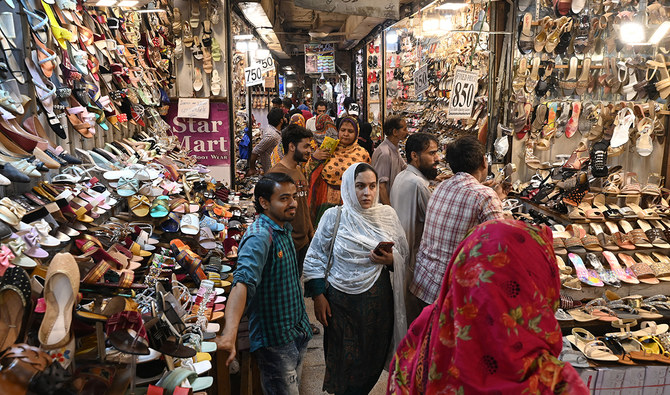LAHORE: The holiday that marks the end of the Muslim fasting month of Ramadan used to be a guaranteed earner for Pakistan’s small shops and businesses — a big-spending week that could match the take from the rest of the year.
This year, however, many worry they will not even make enough to pay their monthly rent, with inflation hitting its highest levels in decades and political turmoil miring the country in uncertainty.
“There are no customers, there are no buyers,” said Shehzad Ahmed, who runs a shop selling bags, jewelry and other goods in the eastern city of Lahore.
The South Asian country of more than 220 million people saw year-on-year inflation hit 35.4 percent in March. Food prices surged more than 47 percent in 12 months, with transport costs rising by 55 percent.
Pakistan is deeply in debt and needs to introduce tough reforms to unlock a tranche of a $6.5 billion bailout from the International Monetary Fund in order to avoid default.
The economy has been wrecked by years of financial mismanagement and political instability — a situation exacerbated by a global energy crisis and devastating floods that left a third of the country under water last year.
The end of Ramadan, Eid Al-Fitr, is celebrated by Muslims around the world by feasting with relatives and friends, exchanging gifts, and dressing up in new clothes and shoes.
The dire economic straits have, however, cast a decidedly somber mood across the country’s normally vibrant markets.
“There are significantly fewer shoppers compared to last year — and it’s because of inflation,” trader Saif Ali told AFP.
Sheikh Amir, who runs a small shop selling glass bangles and imitation jewelry, said he was usually able to earn enough for the whole year during Eid.
“It’s become very difficult these days,” he said. “We are just going through the motions in the hope that we will be able to make enough to pay the rent for our shops.”
Major shopping districts across the country usually see a surge in spending in the week leading up to the holiday, which begins with the sighting of the new moon, expected this weekend.
In urban centers, markets and shops stay open until after midnight — many putting on special offers or sales to attract customers.
Twinkling holiday lights adorn many bazaars to attract customers, while street vendors set up stalls offering special holiday treats.
This year, all have reported a significant drop in sales.
“Our business is slow,” said Ali, who was hoping to sell hundreds of embroidered shawls in the run-up to Eid.
For Fatima Azhar Mehmood, a mother of seven daughters, this Eid will be a budget-conscious one.
“I have to shop for them, and at the same time I have to buy things for the house,” she said.
Instead of buying off-the-rack clothes for the girls, Fatima went shopping for fabric in the Old Lahore district and plans to home-stitch their holiday outfits.
“We have to buy rations, buy things for the children... and our rent is going to be due soon too,” she said.
“Everything is upon us at the same time.”
Shocked at the price of goods this year, Amna Asim decided that in her household, only the children would get gifts this year — adult relatives would have to go without.
“Shopping for the kids is a must,” she said.
“We can’t leave the kids out. Even if we don’t get anything for ourselves we must get something for the kids.”












